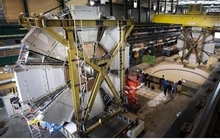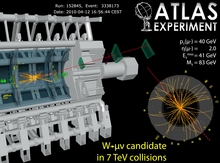Research Interests:
High-Energy Physics with the ATLAS Experiment at the CERN Large Hadron Collider
My research is in the field of experimental high-energy physics (HEP). The goal of HEP is to uncover the basic building blocks of nature and the forces between them. In our current understanding of nature, called the “Standard Model”, the building blocks are quarks and leptons, while the forces are mediated by gauge bosons. The focus of my current research is the ATLAS experiment at the CERN Large Hadron Collider. The BU group has used ATLAS data to measure Standard Model processes (W and Z cross sections, WWW final states, production of top quarks) and to search for new physics (new gauge bosons (W’ and Z’), new strongly interacting particles called “technihadrons”, vector like quarks, and dark matter).
Selected Publications:
“Search for triboson W±W±W∓ production in pp collisions at √s = 8 TeV with the ATLAS detector”, ATLAS Collaboration, Eur. Phys. J. C 77 (2017) 141.
“Search for new particles in events with one lepton and missing transverse momentum in pp collisions at √s= 8 TeV with the ATLAS detector”, ATLAS Collaboration, JHEP 09 (2014) 37.
“Observation of a new particle in the search for the Standard Model Higgs boson with the ATLAS detector at the LHC”, ATLAS Collaboration, Phys. Lett. B716 (2012) 1-29.
“Search for high–mass dilepton resonances decaying to dilepton final states in pp collisions at √s = 7 TeV with the ATLAS experiment”, ATLAS Collaboration, JHEP 1211 (2012) 138.
“Observation of the top quark”, DØ Collaboration, Phys. Rev. Lett. 74, 2632 (1995).
Education:
- Stanford University, PhD in physics, 1986
- University of Notre Dame, BS in physics with high honors, 1980
Honors/Awards:
- European Laboratory for Particle Physics (CERN) Scientific Associate (1986-88)
- Department of Energy Outstanding Junior Investigator Award (1997)
- High Energy and Particle Physics Prize of the European Physical Society (with the ATLAS and CMS collaborations-2013)
In the news:
- CERN experiments observe particle consistent with long-sought Higgs boson
- The Large Hadron Collider: it's live
Research Descriptions:
The ATLAS Experiment at CERN
The ATLAS experiment is a large detector system developed by a collaboration of physicists from around the world to study very-high-energy proton-proton interactions at the Large Hadron Collider (LHC) at CERN, a laboratory for high energy physics near Geneva, Switzerland. Boston University personnel were involved in the construction and installation of the muon detectors for ATLAS. The detectors occupy a region the size of a five-story building and measure the trajectories of muons in a magnetic field with a precision of better than 1/10 of a millimeter. This permits precise determination of the muon momentum which is an important ingredient in searches for new phenomena at the TeV energy scale. Boston University has also played a leading role in the development of computing and analysis tools.
 Physics (Internal)
Physics (Internal)


